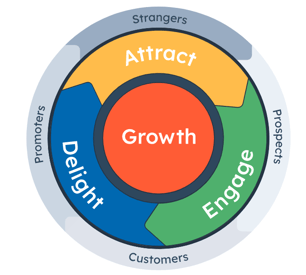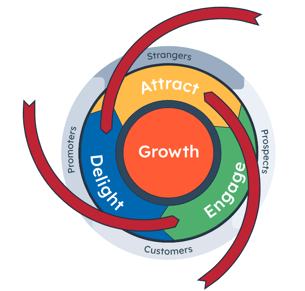What is Inbound Marketing?


Are you wondering what inbound marketing is and how it differs from other marketing techniques? If so, you are in the right place. Let us start by understanding what is inbound marketing.
What is Inbound Marketing?
Inbound marketing is a customer-centric approach to marketing. It focuses on attracting potential customers to your business. This approach does it by creating valuable content and experiences. Particularly, they are designed to address the specific needs and interests of customers. Your business will not interrupt potential customers with traditional outbound marketing techniques when following inbound marketing. Examples include not cold calling or advertising. But, in inbound marketing you will seek to create a connection. Also, it aims at building trust with customers by providing helpful information and resources. They can use these resources and information to solve their problems.
Inbound marketing strategies typically include creating blog posts and videos. It involves creating social media content and other types of content. They are generally optimized for search engines. Also, they are designed to capture the attention of potential customers. Let us consider that a potential customer engages with this content. When this happens, your business can use various tactics to build a relationship. Examples of the techniques you can follow include email marketing, lead nurturing and personalized offers. Thereafter, the business can guide them toward a purchase decision.
Overall, inbound marketing is a more organic and customer-focused approach to marketing. Its key focus is on building relationships. Also, its focus is on providing value rather than simply trying to sell a product or service.
How is Inbound Marketing Different from Other Marketing Techniques?
Now, you know what is inbound marketing. Indeed, you might be wondering how this technique of marketing is different from others.
Inbound marketing is different from other marketing techniques, such as outbound marketing. The reason is that it focuses on attracting potential customers to your business. It does not want to interrupt customers with advertisements or sales pitches. Here are some key differences between inbound marketing and other marketing techniques:
- Customer-centric approach: Inbound marketing is a customer-centric approach to marketing. It seeks to create a connection and build trust with potential customers. This is done by providing valuable information and resources. These resources are aimed at addressing the specific needs and interests of customers.
- Pull vs. push: Inbound marketing is a pull strategy. It means that when your business uses inbound marketing, your team will create content that people are actively searching for. You will not push your message out to a broad audience.
- Permission-based: Inbound marketing is permission-based. It means that customers opt-in to receive communications from a business. But, other marketing techniques bombard customers with unwanted ads or messages.
- Long-term focus: Inbound marketing is a long-term strategy. It focuses on building relationships with potential customers over time. It does not try to make a quick sale.
- Measurable Outcomes: Inbound marketing relies on data and analytics. The purpose is to measure the success of campaigns. In turn, your business can optimize its efforts and improve the outcomes over time.
Overall, inbound marketing is a more organic and customer-focused approach to marketing. It emphasizes building relationships and providing value. It does not simply try to sell a product or service.
Ways to Apply Inbound Marketing:
You can apply inbound marketing in your organization in three different ways:
Attract:
When you follow this technique, you will be attracting the right people to your business. You will do this by providing them with valuable conversions and content. By doing this, you will establish yourself as a reliable advisor. They will show interest to engage with an advisor.
Engage:
Let us consider that you choose this technique. In this case, you will engage your customers by presenting them with solutions and insights. Particularly, these things you provide them will align with their goals and pain points. In turn, the probability of them buying from your business will increase considerably.
Delight:
You decide to delight your customers as an inbound marketing technique. When you do this, you will provide them with support and help. These things will empower them to find success with the purchase they make from your business.
With one of these inbound marketing techniques, you can please your customers. When they find success, they will share the information about their success with their friends and family. In turn, new prospects will be attracted to your business creating a self-sustaining loop. Using this opportunity, your business can build momentum. For this reason, inbound marketing provides the best foundation for the concept called a flywheel.
What does Flywheel Mean?
You might have heard about HubSpot for sure. Flywheel is nothing but a business model that HubSpot uses. The purpose is to explain the momentum that your organization can gain by giving importance to and delivering an exceptional experience to your customers.

In your flywheel, you can spin and can build momentum. You can do this by investing in strategies that gain and retain customers. These are forces for your flywheel, while anything that makes your flywheel sluggish is referred to as friction. In most instances, the biggest sources of friction to your customers come when handover between teams happens. Therefore, communication and alignment between teams are essential things to keep your flywheel moving.

When your flywheel functions on the basis of inbound marketing, the functions of your service, sales and marketing teams can add force and can get rid of friction all through the delight, engage and attract phases of inbound marketing. Any task done in your organization by these teams should function with the motto of getting rid of friction from the flywheel.
For instance, when you take the case of the attract phase, your marketing team will play a key role as people in this team will do things like running paid advertisements, event marketing and blogging. On the other hand, your sales team too can add force by engaging in social selling. The customer service team can keep the flywheel spinning by making it simple for the present customers to make referrals.
Importance of Inbound Marketing
Now, after knowing what is inbound marketing, you will be interested in knowing why inbound marketing is important. Here are some points that will help you understand its importance for the growth of your business:
Inbound Marketing is Long-Term:
Inbound marketing is important for your business as it is a long-term marketing strategy. As against outbound marketing campaigns that last for only a short period, inbound marketing is sustainable. Inbound marketing strategy is not restricted to selling a product or service alone. But, it even aids the overall business growth. As it is a long-term marketing strategy, it indeed takes to set the foundation. It is built in a phased manner. It can take time to build inbound marketing strategies like planning and implementing forms, emails and content. Above all, deciding the channels to rely on like building social media followers or email lists can take time. Nevertheless, all these endeavors can give positive outcomes for the future of your business.
When you implement inbound marketing, your business can build content that can be helpful with nurturing leads and converting them. Over time, you can continue to improve and change this technique based on the evolving requirements of your business. So, the long-term nature of inbound marketing makes it important as the marketing technique for your business to grow.
To Bring Down Expenses:
Another factor that makes inbound marketing important for your business is that you can spend more focused and leaner advertising expenses. In turn, your business can save a lot of money and can expect a higher return on investment over time by choosing inbound marketing. On the other hand, when you choose other mass marketing techniques, you will have to spend more. Also, they are risky as you cannot expect the intended return.
To Build Brand Awareness and Authority:
In inbound marketing, you will follow techniques like SEO, social media marketing and blogging. These are crucial in providing your brand an upper hand over similar kinds of products in the same race. These techniques will help your business create brand awareness. Also, they will prove to be helpful when your customers look for solutions to their marketing requirements as they will already be aware of your products.
It can be Personalized:
Another factor that makes inbound marketing important for your business is that you can personalize it. When you follow inbound marketing, you can personalize your messages to specific leads and visitors.
When you follow traditional marketing channels, you will more likely to change your advertising content on the basis of the demographics of every channel. But, with inbound marketing, you can create personalized CTAs for your visitors. So, the site experience of every visitor can be made unique to him/her. It is much more effective as compared to reaching all your customers with a one-size-all-fit strategy.
Conclusion
So, now you know what is inbound marketing and also why inbound marketing is importantfor the growth of your business. You can get help from experts in this field to achieve more by following the best inbound marketing strategies.

